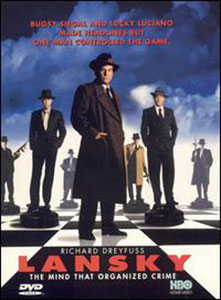The Amazon Prime description for “Lansky” (1999) includes “notorious,” “gambling,” “bootlegging,” “racketeering” and “murder,” but the film – written by David Mamet and directed by John McNaughton for HBO – paints a warm picture of mob boss Meyer Lansky (1902-83).
Along with a treasure of a performance by Richard Dreyfuss, “Lansky” is driven by the intrinsic fascination of someone who is a normal family man and skilled businessman, but who is targeted by the U.S. federal government and hated by a percentage of the populace.
Biopic in pastiche form
Mamet gives us a biopic in pastiche form, picking and choosing what to focus on. Other than “Homicide” (1991), this is the film where he most digs into the Jewish experience, as Lansky is both prideful and self-loathing about his race, although usually he prefers the issue not be raised at all.

“Lansky” (1999)
Director: John McNaughton
Writers: David Mamet (screenplay); Uri Dan, Dennis Eisenberg, Eli Landau (book)
Stars: Richard Dreyfuss, Yosef Carmon, Mosko Alkalai
After fleeing Eastern Europe, where he sees an old man murdered in the street with an ax, young Meyer and his family settle in New York, where he is soon harassed by Italian boys for being Jewish. An older friend wades into a rigged dice game and beats up the leader.
As Lansky tells a reporter in the movie’s final scene that ties things together, his childhood shaped him. In his case, the key components of his identity are his Jewishness and the method by which one gets their way in a harsh world.
I’m glad for that final interview scene and other occasional moments of clarity in “Lansky,” because unless a viewer is already a Lansky scholar, there’s no way to grasp all the biographical details. The film doesn’t include times and locations at the bottom of the screen, and Lansky is played by a couple different actors before Dreyfuss, including Max Perlich (Whistler from “Buffy”).
The narrative is somewhat linear, but once it gets to the climactic events – Lansky flying around the globe, seeking asylum while being pursued by the FBI in the 1970s – it peppers in flashbacks that complete his life story up to that point.
Warm but distant
Lansky’s relationships are warm but ephemeral. His first wife is Anna (Illeana Douglas); his second wife is Teddy (Beverly D’Angelo). He has two sons, one who goes to West Point (with Meyer greasing the wheels for his admission), and another who is crippled and whom Meyer seems to brush aside compared to his able-bodied son.
It’s also suggested that Meyer has always pined for a beautiful brunette who is the girlfriend of one of his colleagues. While I was engaged in any given scene showing Lansky’s relationships, it’s frustrating that many details remain out of grasp and some threads go unfinished.
Lansky operates in fields the federal government is suspicious of, and to boil down this moral and political minefield, “Lansky” focuses on Meyer’s views on gambling. He himself is a gambler, he says, referring to his business dealings as well as his enjoyment of gaming and betting.

And people love gambling, so it will always exist, regardless of the law. So it’s unfair that he is harassed by the government – not to mention hypocritical, as several states start their own lotteries in Lansky’s lifetime.
Given Mamet’s recent defense of friends who greased the wheels of the college admissions process, it’s interesting that Lansky does the same. Lansky is playing the game by paying the right people to get his son into West Point, the film shows us, and it’s unfair that the player be attacked by a government that allows the game to exist. To Lansky (and to Mamet on this issue), he’s a businessman making a decision within the rules of that “business.”
Murder in context
But what about the “murder” part of the description? Well, even murder has context. Meyer, as a teenager, does indeed murder a bully upon his arrival in America. Although “Lansky” shows this scene, it so engagingly moves on to other things that I had put it out of my mind until the film brings it up again. That’s a nice parallel to the fact that Lansky got away with the murder – at least from a legal perspective. A closing title card notes that Lansky was never convicted of a major crime.
Any time a notorious figure is sympathetically portrayed in a biopic, it won’t get wide raves (see also “Phil Spector,” where Mamet digs into the possibility that Spector is innocent of the murder many people assume he committed).
But “Lansky” stands out in this genre for portraying a mob boss whose personality doesn’t fit what we’d expect, in comparison to the default setting of Robert De Niro’s frightening Al Capone from the Mamet-written “The Untouchables.”
Lansky is an unthreatening guy with sharp business skills – the ability to do math in his head, the confidence to make the right connections – who is driven to succeed in a world he thinks hates him. It’s not a full picture of Meyer Lansky, but it’s a fascinating one.

